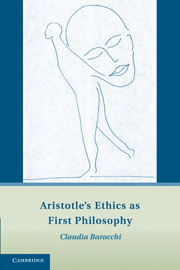Book contents
- Frontmatter
- Contents
- Acknowledgments
- Introduction
- 1 Prelude: Before Ethics. Metaphysics A and Posterior Analytics B.19
- 2 Main Section. Ēthikōn Nikomakheiōn Alpha to Eta
- 3 Interlude. Metaphysics Gamma
- 4 Concluding Section. Ēthikōn Nikomakheiōn Theta to Kappa
- 5 Kolophon
- Selected Bibliography
- Index of Passages
- Index of Subjects and Names
3 - Interlude. Metaphysics Gamma
Published online by Cambridge University Press: 24 July 2009
- Frontmatter
- Contents
- Acknowledgments
- Introduction
- 1 Prelude: Before Ethics. Metaphysics A and Posterior Analytics B.19
- 2 Main Section. Ēthikōn Nikomakheiōn Alpha to Eta
- 3 Interlude. Metaphysics Gamma
- 4 Concluding Section. Ēthikōn Nikomakheiōn Theta to Kappa
- 5 Kolophon
- Selected Bibliography
- Index of Passages
- Index of Subjects and Names
Summary
Metaphysics Gamma opens by addressing the first of the aporiai laid out in Book Beta, namely, the question: does it belong to one or many sciences to investigate the causes, or principles (995b4–6, discussed at 996a18–b26)? As Aristotle notes, the issue was already anticipated in Book Alpha:
All believe that what is called wisdom is concerned with the first causes and principles. So, as stated before, someone experienced seems [δοκεῖ] to be wiser than one who has any of the sensations, an artist [τεχνίτης] wiser than one who is experienced, a master artist [ἀρχιτέκτων] wiser than a manual worker [χειροτέκνου], and the theoretical [sciences seem to be wisdom] to a higher degree than the productive [sciences] [αἱ δὲ θεωρητικαὶ τῶν ποιητικῶν μᾶλλον]. Clearly then, wisdom is the science of certain causes and principles.
(981b28–982a3)Aristotle proceeds to illuminate this point further when he speaks of “the science taken in the highest degree”:
such is the science of that which is knowable [ἐπιστητοῦ] in the highest degree; and that which is knowable in the highest degree is that which is first and the causes, for it is because of these and from these that the other things are known [γνωρίζεται], and not these because of the underlying subjects. Finally, the most commanding [ἀρχικωτάτη] science, and superior [μᾶλλον ἀρχική] to any subordinate science, is the one which knows [γνωρίζουσα] that for the sake of which each action is done, and this is the good in each case [τἀγαθὸν ἑκάστου], and, comprehensively, the highest good [τὸ ἄριστον] in the whole of nature.
(982b1–7)- Type
- Chapter
- Information
- Aristotle's Ethics as First Philosophy , pp. 220 - 259Publisher: Cambridge University PressPrint publication year: 2007



